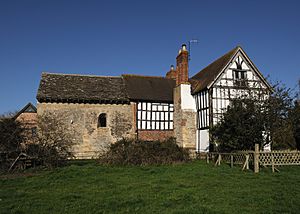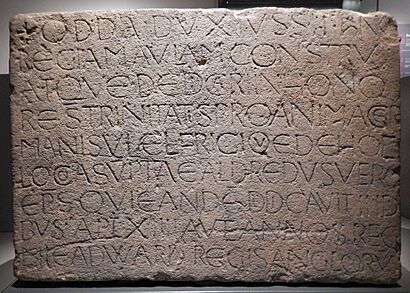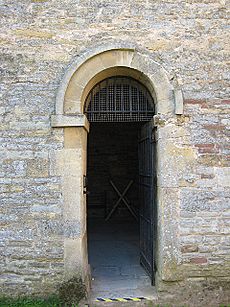Odda's Chapel facts for kids
Quick facts for kids Odda's Chapel |
|
|---|---|
| Chapel of the Holy Trinity | |

Odda's Chapel (left) and Abbot's Court (right)
|
|
| Lua error in Module:Location_map at line 420: attempt to index field 'wikibase' (a nil value). | |
| OS grid reference | SO86902984 |
| Location | Deerhurst, Gloucestershire |
| Country | England, UK |
| Denomination | Roman Catholic |
| Website | Odda's Chapel |
| History | |
| Status | chantry |
| Founder(s) | Earl Odda |
| Dedication | Holy Trinity |
| Consecrated | 12 April 1056 |
| Architecture | |
| Functional status | disused |
| Heritage designation | Grade I listed |
| Designated | 4 July 1960 |
| Style | Anglo-Saxon |
| Years built | 11th century |
| Completed | 1056 |
| Specifications | |
| Materials | rubble masonry with squared quoins |
Odda's Chapel is a very old building in Deerhurst, Gloucestershire, England. It was built in the 11th century, around 1056. This was just ten years before the Norman Conquest of England, a big event in English history.
The chapel was once a special place for prayer, called a chantry. People would pray there for the souls of others. Later, in the 1500s, it stopped being used for worship. By the 1600s, it had become part of a farmhouse.
People forgot it was a chapel for a long time. It was rediscovered and fixed up in the late 1800s and again in the 1900s. Today, English Heritage looks after it.
Odda's Chapel is one of two old Anglo-Saxon churches in Deerhurst. The other, St Mary's Priory Church, is older and bigger. Both buildings were part of a Benedictine priory, which was like a monastery.
Contents
What Odda's Chapel Looks Like
The chapel has two main parts: a nave and a chancel. The nave is the main area where people would stand. The chancel is the part near the altar.
Inside the Chapel
A special arch connects the nave and the chancel. This arch is built in a style called Romanesque. It has a rounded top.
There is also a smaller Romanesque arch that forms a doorway on the north side of the chapel. The nave has small windows placed high up on its north and south walls.
The Chapel's Story
Earl Odda was a powerful person who had this chapel built. He wanted it built to help the soul of his brother, Ælfric, who died in 1053.
When the Chapel Was Opened
The chapel was officially opened on April 12, 1056. Ealdred, who was the Bishop of Worcester, led the special ceremony.
Changes Over Time
During the English Reformation in the 1500s, big changes happened in England. King Henry VIII and later King Edward VI stopped the use of chantries. This meant Odda's Chapel could no longer be used for its original purpose.
Around the late 1500s or early 1600s, the chapel became part of a timber-framed farmhouse called Abbot's Court. This farmhouse was built right next to the chapel's east wall.
The main part of the chapel, the nave, was turned into a kitchen. A new floor was added in the chancel, making it into two levels. New windows with three or four sections were put into the chancel's north and south walls. Over time, people forgot that the building was once a chapel.
Odda's Stone: A Clue from the Past
In 1675, a local landowner named Sir John Powell found a stone slab near Deerhurst. Sir John was a judge, so he could read the old Latin writing on the stone.
The stone's message was about the chapel's dedication in the 11th century. However, even with this clue, people still didn't know where the chapel itself was.
What the Stone Says
The writing on the stone translates to: "Earl Odda ordered this royal hall to be built and dedicated in honour of the Holy Trinity for the soul of his brother Ælfric, taken up from this place. Ealdred was the bishop who dedicated the building on the second day before Ides of April in the fourteenth year of the reign of Edward, king of the English".
Today, "Odda's Stone" is kept at the Ashmolean Museum in Oxford. There is a copy of the stone inside Odda's Chapel for visitors to see.

Finding and Fixing the Chapel
In 1865, the local church leader, Rev. George Butterworth, learned from old records that there had been a chantry chapel in Deerhurst. He also knew about Odda's Stone.
Then, in 1885, during repairs to Abbot's Court farmhouse, workers found a hidden Anglo-Saxon window behind some plaster. This was a big clue!
In 1960, the Ministry of Works officially recognized the chapel as a "Grade I listed building." This means it's a very important historical building.
In 1965, the chapel was carefully separated from the farmhouse. Work then began to restore its roof. Old photos show that while most of the roof was from the 1600s, there were parts from the 1000s or 1100s. These older parts might have been from the original roof.
Since the 1970s, archaeologists have dug up the area around Deerhurst. They found many interesting items from an excavation in 1981. These items are now on display at the Tewkesbury Museum.
 | William M. Jackson |
 | Juan E. Gilbert |
 | Neil deGrasse Tyson |



